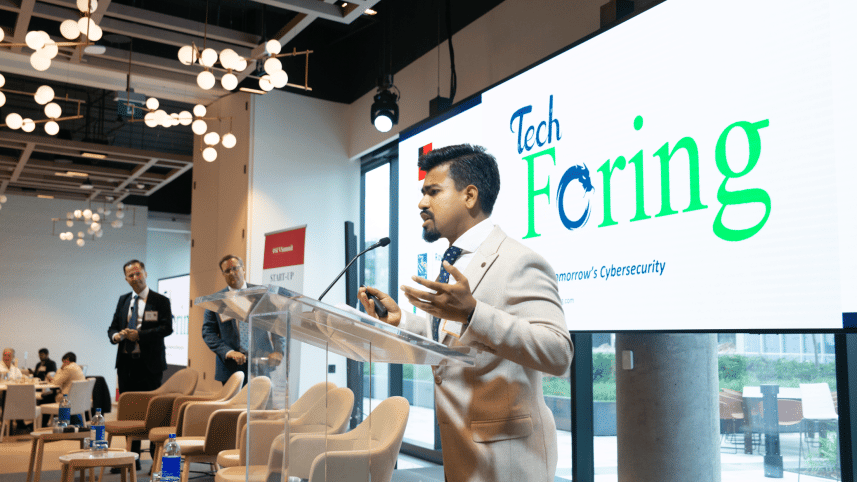Building a cybersecurity company from scratch

Security is one of the major aspects in our life that we think about on a daily basis. In today's environment, cyber risks are just as significant as physical ones. The demand for cybersecurity, a word used to describe defence against threats related to the internet, has grown dramatically as society becomes increasingly digitally oriented.
In an exclusive interview with The Daily Star, Rabiul Islam, CEO and Managing Director of Techforing who is also a cybersecurity specialist, has shared insights into the journey of Techforing, a cybersecurity company.
Could you share the story behind founding your cybersecurity company and what inspired you to enter this industry at a young age?
I did not know any entrepreneurs when I was young. But from a young age, I thought everyone wants a job but someone has to provide those jobs. I completed my SSC in 2009 and then went to complete my further studies in India. That is when I got my first computer. After coming back to Bangladesh from India, I had a study gap for about a year for learning about computers. At that time, I indulged myself into doing things which are considered unethical in today's world like hacking someone's website, DDos or working with malware. It was a hobby to me. Then when I was 17, I went to Malaysia to study English. In abroad, I had to earn money by odd jobs or something else. I chose freelancing. As a freelancer, I worked in fields related to cybersecurity in the platform Elance-oDesk, currently known as Upwork. I was very successful in freelancing. After a year, I chose a different track and went to Russia with a scholarship to complete my bachelors in Information and Technology.
As my clients grew, the need for a team became inevitable. That's how the idea of Techforing came to light. I came back to Bangladesh and formed Techforing in February of 2015. Initially, with a very small team, we began the journey of Techforing. Later on, in 2016, I went to Turkiye for my masters in Computer Science and Engineering (CSE). I used to manage my company remotely which I still do till date as I am constantly travelling. Techforing is registered in Bangladesh, USA, UK and Canada.
How do you manage a company remotely and what is your recruiting strategy as formal education in cybersecurity is not that much popular in Bangladesh?
As an entrepreneur, I realised depending on the people is not sufficient. You need a good team to run a business of course but when the owner is absent, then it becomes very difficult to make the team productive. From that thought, I realised that I need to build a system for the company to scale further. So, I built a system that runs without my presence and gives me proper data. Part of this system was talent acquisition. We did not find that many hands-on cybersecurity experts in Bangladesh. So, we started to recruit freshers who are interested and passionate enough and also experts if they are interested. We nurtured and trained the freshers in cybersecurity. We also made Techforing Growth which provides HR solutions to platforms working across multiple continents.
Did you invest in any other companies? What are the biggest challenges that you have faced so far?
Alongside Techforing, I also invested in a company named 'Biyog' in 2018. However, in 2020, my Upwork profile was banned due to policy violations and I had to step aside from 'Biyog' because of COVID as it did not work out well and I lost half a million dollars. Techforing also lost clients due to the Upwork profile being banned. At that time, I was in Turkiye and was down to my last 8,000 dollars losing all hopes. I was in a pretty rough state. Luckily, I met a gentleman named Phil from the USA in Istanbul who invested 10,000 USD into my future plans. Using that fund, I began looking for clients using agencies but in the next six months, I could not generate any clients as cybersecurity is a very specialised technical service. As I was losing all hopes, I also learned a few tricks with the sales people and closed a deal with a client in November of 2020 and that deal has made the turn around that Techforing needed. Currently, we have a profit margin of 60%.
Another challenge, I think something I must mention is founding a company in Bangladesh. There are a lot of guidelines when it comes to forming a registered company in Bangladesh. Young entrepreneurs often face problems when registering for companies in our country. I also faced problems when registering Techforing. If this process was made easier and time bound, it would be a big help for young entrepreneurs. Even if any companies are rejected in their process of application, they should receive feedback on how to tackle that issue. If names and numbers of contact people are made public, that would also be very helpful for followup of potential founders in Bangladesh. Hiring lawyers for these purposes is costly as a large segment of founders are very young. If the process is automated and templates are given accordingly, I think any student can register a private limited company in Bangladesh which would be a big help in creating a larger startup community in the country.
What measures can be taken by the government, businesses, companies and related stakeholders to ensure proper cybersecurity?
The best suggestion I can give is to educate employees with training sessions and awareness. Moreover, they need to have a 'Zero trust' policy. Update the existing systems and policies on a routine basis. Some companies think they are well protected with having a cybersecurity expert on their team but it is also important to assess the capabilities of the dedicated team member. Anyone can also hire third parties like us to do assessment of your cybersecurity conditions. Banks, Mobile financial services, vendors connected to government agencies must have good cybersecurity strategies in place.
If anyone brings in cybersecurity experts to enhance security, how can they know that their systems are secured after the job has been done by a third party organisation?
First of all, in order to secure something, you do not have to give away access. Second of all, you can give away access. But all of the security credentials need to be updated after the contract work has been done by the third party organisation. In order to prevent 'Backdoor' entry points, organisations need to build a foolproof contract which will make the third party organisations accountable if any harm has been done.
How do you maintain security in your own team?
We monitor our team members virtually. They must share the work they are doing at all times. All of their works are recorded with a screen recorder and it goes to quality assurance. We also do due diligence, and background checks before hiring any employees. We also maintain a 'Zero trust' policy and do not give all access to one employee. Team members are monitored by automated processes and by their supervisors. In our team, the senior level employees who earned a place of trust get most access when it comes to performing specific tasks.
Lastly, as an entrepreneur, what are the three suggestions you would give to young entrepreneurs?
Firstly, educate yourself as knowledge is free in today's world. Anyone can learn anything if they truly want. Secondly, have a mindset. Do not be confused about what you want to do. Thirdly, you must take action immediately and have patience. Do not wait for two years or three years or the right time.




 For all latest news, follow The Daily Star's Google News channel.
For all latest news, follow The Daily Star's Google News channel.
Comments